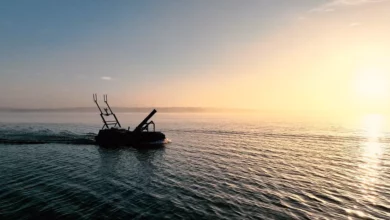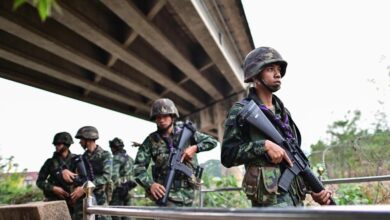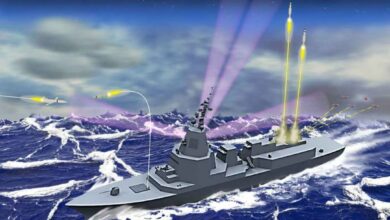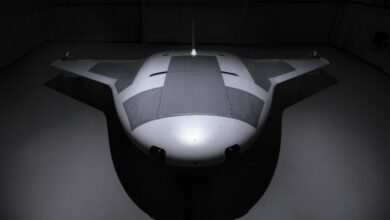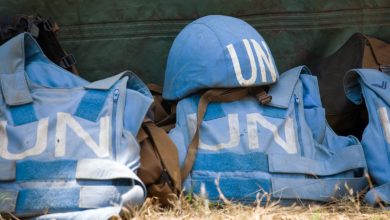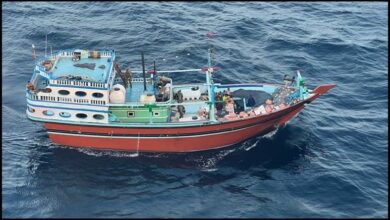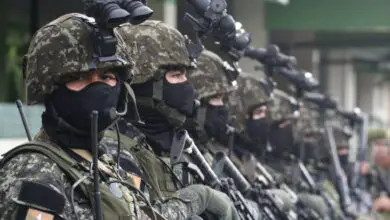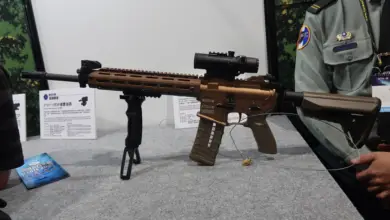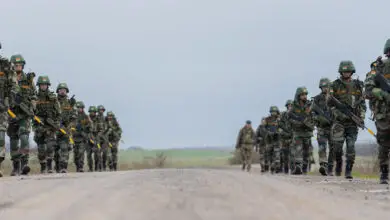China Stages War Games in ‘Stern Warning’ to Taiwan
China held air and sea drills around Taiwan on Saturday, in what it said was a “stern warning” after the island’s vice president visited the United States.
William Lai — the frontrunner in Taiwan’s presidential election next year and a vocal opponent of Beijing’s claims to the island — returned Friday from a trip to Paraguay, during which he stopped in New York and San Francisco.
China has reacted angrily to the US stops, and on Saturday reiterated that Lai was a “troublemaker” while vowing to take “resolute measures… to safeguard national sovereignty and territorial integrity.”
The People’s Liberation Army “launched joint air and sea patrols and military exercises of the navy and air force around the island of Taiwan” on Saturday, military spokesperson Shi Yi said, according to state media outlet Xinhua.
Taiwan said 42 warplanes had entered its air defense zone since 9 am (0100 GMT), and eight Chinese vessels cooperated in the exercises.
Twenty-six of the warplanes involved crossed the Taiwan Strait median line, the island’s ministry of defense said in a statement.
Xinhua said the drills were carried out “in the waters and airspace to the north and southwest of Taiwan Island” to test the PLA’s ability “to seize control of air and sea spaces” and fight “in real combat conditions.”
They were also intended to serve as “a stern warning to the collusion of ‘Taiwan independence’ separatists with foreign elements and their provocations,” it added.
A social media video published by the PLA on Saturday showed soldiers in fatigues sprinting through a military facility and fighter jets soaring above clouds, set to action movie-style music.
Taiwan said it strongly condemned “such irrational and provocative behaviour” and that it would dispatch “appropriate forces” to respond “with practical actions”.
“Conducting a military exercise this time under a pretext not only does not help the peace and stability in the Taiwan Strait, but also highlights (China’s) militaristic mentality,” Taiwan’s Ministry of National Defence said.
Taiwan has condemned China’s “irrational and provocative behavior” after its military announced drills around the island nation. pic.twitter.com/E9vcb8e6ZE
— TaiwanPlus (@taiwanplusnews) August 19, 2023
‘New Provocative Move’
China claims Taiwan as part of its territory and has pledged to take it one day, by force if necessary.
It launched major military exercises after Nancy Pelosi, then House speaker, visited Taiwan last year and later when President Tsai Ing-wen transited through the United States.
However, Sifu Ou at Taiwan’s Institute for National Defense and Security Research told AFP he thought “the scale of PLA exercise (this time) will be moderate”.
“It will put pressure on Taiwan and not cause negative effects that will help William Lai,” Ou said.
Taiwan’s foreign minister Joseph Wu accused China of trying to interfere with Taiwan’s presidential elections in January.
“The PRC has made it clear it wants to shape Taiwan’s coming national election,” Wu wrote on social media.
“Well, it’s up to our citizens to decide, not the bully next door.”
When China previously launched military exercises around Taiwan during an election year, they were seen as helping candidates from Lai’s ruling Democratic Progressive Party (DPP), which is largely regarded as pro-Washington.
The United States had called for calm over Lai’s visit, which it described as routine travel.
Lai stopped in New York and returned via San Francisco en route to and from Paraguay, one of the dwindling number of nations that diplomatically recognizes Taipei.
But on Saturday, an official from the Communist Party’s Taiwan Work Office “strongly condemned” Lai’s trip, calling it a “new provocative move” by the DPP, “to further collude with the United States,” Xinhua said.
At a lunch in New York during the trip, Lai vowed “to resist annexation” and continue to uphold the core tenets of Tsai’s administration.
Lai has been far more outspoken about independence than Tsai, to whom Beijing is already hostile as she refuses its view that Taiwan is a part of China.
At a summit on Friday, the leaders of the United States, Japan, and South Korea said they opposed China’s “dangerous and aggressive behavior” asserting maritime claims in the Indo-Pacific region.
“We reaffirm the importance of peace and stability across the Taiwan Strait as an indispensable element of security and prosperity in the international community,” it said.


